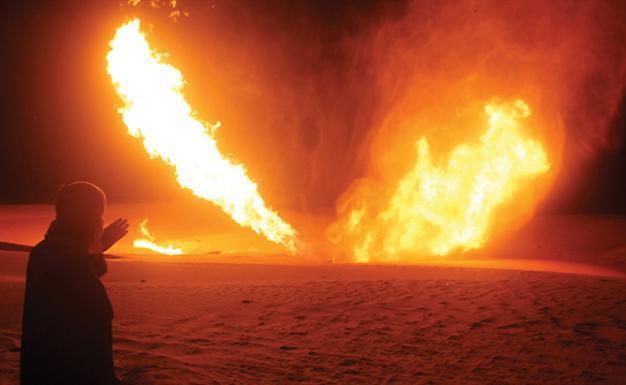Egypt halts gas to Israel for ‘commercial reasons’
CAIRO

This file photo shows an Egyptian man looking at flames rising from a pipeline that delivers gas to Israel after it was hit by an explosion north of the Sinai peninsula. AFP photo
The head of the Egyptian Natural Gas Holding Company says it has terminated its contract to ship gas to
Israel because of violations of contractual obligations, a decision Israel said overshadows the peace agreement between the two countries.
The 2005 natural gas deal has become a symbol of tension between Israel and
Egypt since the uprising that ousted Hosni Mubarak last year. For many Egyptians, it symbolizes the close relations that the regime of deposed President Hosni Mubarak forged with Israel and how his associates benefited greatly from such business deals.
Critics charge that Israel got the gas at below-market prices and that Mubarak cronies skimmed millions of dollars off the proceeds. Israel insists it is paying a fair price for the gas, but Egyptian militants have blown up the gas pipeline to Israel 14 times since the uprising more than a year ago. Mohamed Shoeb, the head of the Egyptian Natural Gas Holding Company, said on April 22 the decision to cancel the deal was not political.
“This has nothing to do with anything outside of the commercial relations,” Shoeb told the Associated Press, adding that Israel had not paid for its gas in four months. Israeli Foreign Ministry spokesman Yigal Palmor denied that claim.
Shoeb told Egyptian TV that the decision to cancel the contract had been made on April 19 because “each side has rights and we are representing our rights.” Israel and Egypt signed a peace treaty in 1979, but relations have never been warm.
However, Israel yesterday rushed to downplay the significance of Egypt cancelling the gas export deal, casting it as a “commercial dispute” with no impact on their diplomatic ties. “We don’t see this cut-off of the gas as something that is born out of political developments,” Prime Minister Benjamin Netanyahu told a meeting of heads of the Israel Bonds fundraising organization yesterday. “It’s actually a business dispute between the Israeli company and the Egyptian company,” Netanyahu’s office quoted him as saying. Foreign Minister Avigdor Lieberman said: “The deal to supply gas is not part of the peace deal, but it is an important commercial deal that was an expression of the stable ties between the states. “The unilateral cancellation of the deal is not a good sign, and we hope that this dispute will be resolved like any other commercial dispute, without taking it to the political realm,” Lieberman told public radio from Azerbaijan, where he is on a visit.
Israel insists it is paying a fair price for the gas. Its electricity company has been warning of possible power shortages this summer, partly because of the unreliability of the natural gas supply from Egypt. For the long term, Israel is currently trying to develop its own natural gas fields off its Mediterranean coast, and is expected to be self-sufficient in natural gas in a few years.
Hussein Salem, a close friend of Mubarak, was among the shareholders of East Mediterranean Gas Co., which is a joint Egyptian-Israeli company that carried the gas to Israel. Once a close friend of Mubarak, Salem fled Egypt for Spain and was sentenced in absentia to seven years in jail over the natural gas issue. On the Israeli side, EMG sought international arbitration in October because of the Egyptian side’s failure to supply the quantity of gas stipulated in the contract due to the frequent bombings.
Under the 2005 deal, the Cairo-based East Mediterranean Gas Co. sells 1.7 billion cubic meters of natural gas to the Israeli company at a price critics say is set at $1.50 per million British thermal units a measure of energy. The gas deal has been the subject of litigation in Egypt. An appellate court last year overturned a lower court ruling that would have halted gas exports to Israel. Opposition groups that filed the suit before the uprising claimed that Israel got the gas too cheaply under the 15-year fixed price deal between a private Egyptian company, partly owned by the government, and the state-run Israel Electric Corporation.
